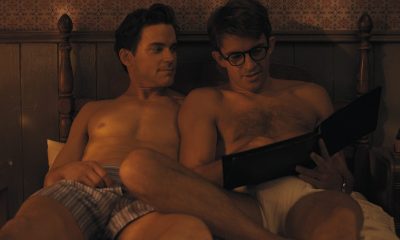Movies
‘Sylvia’ summons queer horror comedy at its comedic best
Something refreshing while we wait for summer movie season to arrive
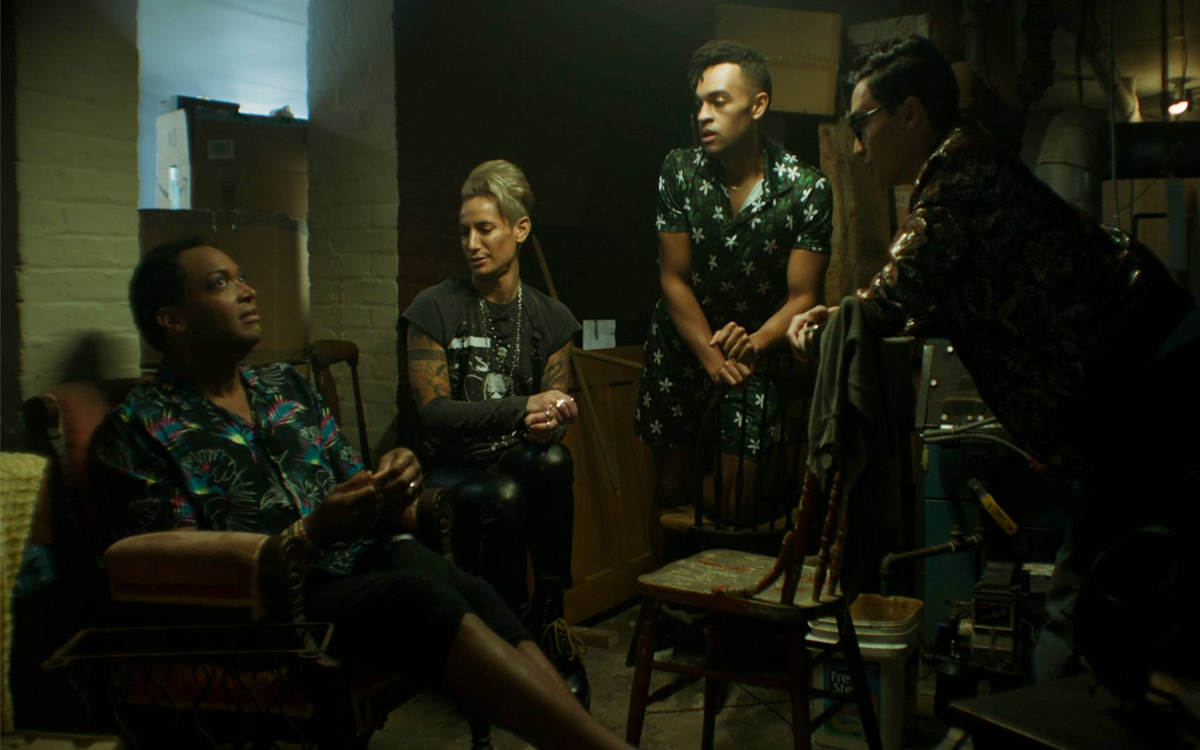
There was a time when the words “straight-to-video” carried an unspoken implication of mediocrity, at best – but that was before a massive shift in the film industry, accelerated but perhaps not solely driven by the pandemic and the need it created for “watch at home” options – changed the game when it comes to judging a movie by its viewing format.
Consider “Summoning Sylvia,” a campy horror comedy that made its VOD premiere on April 7, in which all but one of the characters (two if you count dead people) are queer. It’s safe to say that it’s definitely a “niche” film, and despite being granted a brief-and-perfunctory theatrical run – presumably, like most non-mainstream movies of similar ilk, for the purposes of awards consideration – it’s not the kind of thing that might have gotten a wide big screen release at any point in the history of the American film industry. At first assessment, it might seem like a rollicking, raunchy and VERY gay piece of fluff; it’s all those things, but it has a lot more imagination and ambition behind it than meets the eye from scrolling past the trailer on social media.
Written and directed by Wesley Taylor and Alex Wyse, it’s an absurdly farcical yet genuinely hair-raising adventure in which Larry (Travis Coles), on the eve of being “gay-married,” is kidnapped by his groomsmen (Frankie Grande, Troy Iwata, and Noah J. Ricketts) for a bachelor party weekend at a country house in upstate New York, reputedly haunted by the ghost of a woman (the titular Sylvia, played by Veanne Cox) who murdered her own son (Camden Garcia) before being killed herself by an angry mob 100 years ago. Naturally, the queer quartet tries to unravel this century-old mystery by holding a séance, but the unforeseen addition to the mix of future brother-in-law Harrison (Nicholas Logan) – an ex-soldier with clearly antisocial and possibly homophobic personality issues – turns their tongue-in-cheek party game into a terrifying-yet-hilarious battle with the dark forces that seemingly rule over their fashionably rustic Airbnb.
It’s all very silly, of course, and anyone hoping for hardcore horror featuring malevolent ghosts and demonic possession are likely to be sorely disappointed; what’s surprising is how often it manages to supersede its silliness to deliver more than just the occasional cheap jump scare, and how well it frames its madcap scenario through a perspective that, incredibly, makes everything feel a lot weightier – or at least, more meaningful – than its campy comedic tone invites us to expect.
Some background on the film’s creators quickly offers a possible explanation for why that might be so. Taylor and Wyse, Broadway stalwarts both onstage and off, come at their material from a theatrical tradition that includes such absurdist queer playwrights as Joe Orton, Christopher Durang, Paul Rudnick, and others whose work use pointedly nonsensical contrivances to poke fun at socially relevant themes that might otherwise not be so amusing. Their film is rife with that same surrealist spirit, while still evoking the old-fashioned pleasures of such humorously macabre classics as “Blithe Spirit” or “Arsenic and Old Lace” – a good-natured blending of styles that goes a long way toward opening audiences up to its familiar premise. To put it more simply, if a bit poetically, there is an unmistakable method to the madness.
If references to 20th-century absurdist theater don’t ring a bell for you, it might be more appropriate to draw parallels from a cinematic angle; it’s impossible not to notice how strongly “Summoning Sylvia” evokes the non-stop, throw-it-at-the-wall-and-see-what-sticks comedic milieu of filmmakers like Mel Brooks, whose anything-for-a-laugh style never got in the way of a respectful and proficient cinematic style nor precluded the possibility for scathingly candid cultural commentary, or even the self-aware “meta” sensibilities of someone like Guillermo Del Toro, whose understanding of horror is deeply intertwined with an recognition of the genre’s potential for underscoring fear with a humanistic streak that makes it a vehicle for transcendence as well as for terror.
Still, such comparisons don’t quite capture the exact nature of this unabashedly nonsensical movie’s charms – it’s neither as anarchic as a Mel Brooks film nor as melancholy as a Del Toro – but they approximate the space in which it stakes its claim; it should be obvious to any seasoned film buff that “Summoning Sylvia” carefully aligns its supposedly otherworldly sense of menace with an all-too-realistic fear of violent homophobia, and that its insinuation of an apparently angry straight man with seemingly toxic views about sexuality and gender as a potential existential threat to its queer band of determined-but-daffy protagonists has a lot more significance than a mere plot device. To put it simply, it’s a movie that never tries too hard to drive home its allegorical story arc, which it highlights as much by sending up as by serious contemplation, but it also never tries to pretend that it doesn’t have one, and in serving both ends at once it succeeds in proving that a film can be purely entertaining and still have the kind of substance that keeps it from being simply a guilty pleasure.
It should go without saying that much of its success comes from the ability of its cast to walk the thin line required of them by the material. Though the film’s most recognizable star is arguably out Tony-winning actor Michael Urie, who delivers little more than a cameo performance – albeit a solid and likable one – as Larry’s husband-to-be, it’s up to the rest of the cast to do the heavy lifting; they’re more than capable, with Coles standing out as a strong lead in a diverse ensemble of players, and Grande surpassing expectation with a show-stealing turn as the fiercely femme and unapologetically over-the-top Nico, whose self-proclaimed witchiness and unrestrained libido play a big part in making Larry’s bachelor party a weekend to be remembered, for better or for worse. Even Sean Grandillo, whose short appearance as an unexpected interloper into the weekend’s events adds a memorable dash of winking, trope-twisting humor to the program, makes an impression on the strength of his sheer, joyful goofiness alone.
All of this is not to say that “Summoning Sylvia” is the kind of cinematic masterpiece that makes a whole industry stand up and take notice; while its unpretentiousness allows us to absorb its higher points without heavy-handed obviousness, its messaging is hardly anything new. Even so, any movie that addresses the specter of homophobia – especially in an age when even the comparatively innocent phenomenon of drag, given suitably elevated status by Taylor and Wyse in a highly entertaining climactic sequence, is under attack from bigots desperate to turn the tide of growing queer acceptance – is a welcome addition to our must-see list, and this one manages to do so without sacrificing its sense of humor or its commitment to entertaining us.
It may not change your life, but it’s sure to provide a fun 75 minutes’ worth of viewing pleasure – and that’s more than enough to earn our recommendation for any queer movie fan looking for something new and refreshing while we wait for the summer movie season to arrive.
Movies
Deliciously queer ‘Dead Boy Detectives’ a case worth taking on
A light-hearted, smart, and complex sensibility behind the fantasy
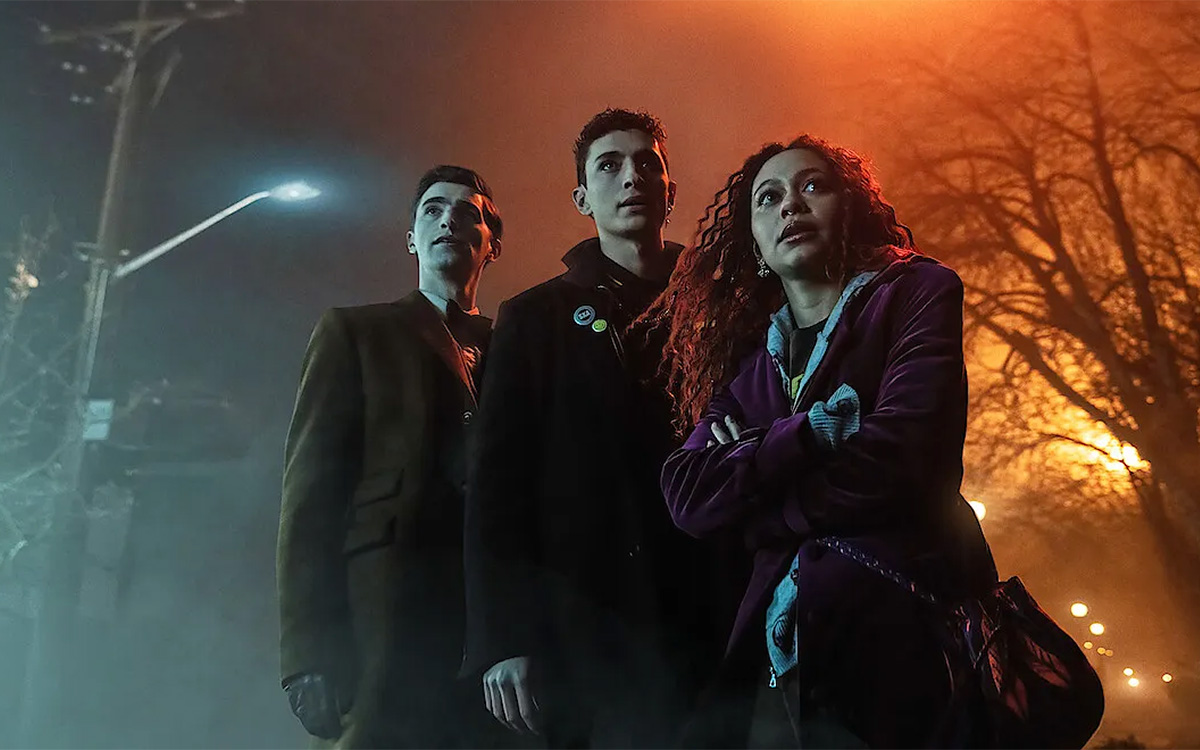
Believe it or not, there was once a time when the Hollywood entertainment industry didn’t take comic books very seriously — but then, neither did anyone else.
In the early days, comics were dismissed by most adults as childish fantasy; indeed, those with a penchant for clutching pearls saw them as a threat to their children’s intellectual development and therefore to the future of America itself. Their popularity could not be denied, however, and Hollywood, ever eager to capitalize on a trend, was certainly hungry to get a piece of the action.
The problem was that the studio lackeys assigned to adapt the comics for the screen during those “golden years” were never actually fans of the comics themselves. The result was a parade of kitschy – if occasionally stylish – low-budget serials, kiddie matinees, and “B movies” which operated, for the most part, at the level of cartoons, and mindless ones at that. Even in the 1960s, when comics like “X-Men” had begun exploring mature themes and turning the comic book into a counterculture phenomenon, the best that Hollywood – now deploying the then-relatively new medium of television – was a “Batman” series that felt even campier than the corny serials of three decades before.
Yet despite being treated as a throwaway genre with no cultural significance or intellectual value, the popularity never went away – and with the generation that grew up with comics now old enough to be working in Hollywood themselves, a new burst of creativity began to infuse the screen’s version of the genre with the kind of nuance and sophistication that fans had always known was there. Fast forward to 2024, when comics-based content dominates not just our movie screens – nobody needs to be told about the way it has shaped (some would say crippled) the mainstream film industry for the last decade or so – but all our other screens, as well. And while much of the material that has resulted from this obsessive fascination with comics (and comics-adjacent material like “Star Wars” and other similar fantasy franchises) often suffers from the same safe “appeal to the LCD” mentality that robbed the vintage stuff of its potential, the artistry of creators who are fans themselves has also resulted in a lot of genuinely good storytelling.
In the latter category, we offer up “Dead Boy Detectives” – a new series derived from a supplemental thread in renowned comics creator-turned-bestselling author Neil Gaiman’s groundbreaking “Sandman”, which debuted last week on Netflix – as a counter to the increasingly popular notion that comic books have hamstrung the industry’s creativity.
Based on characters and storylines that emerged during the original run of Gaiman’s iconic book (published by DC Comics via its Vertigo imprint), it’s a fresh, funny-yet-emotionally engaging supernatural saga in which two ghosts who died in their youth – the titular “Dead Boys” – operate a detective agency in London, solving mysteries for other spirits who need closure before moving on to the afterlife.
The boys themselves – Edwin (George Rexstrew) and Charles (Jayden Revri) – are not quite ready to depart the earthly plane, themselves; on the contrary, they operate on the lam, making sure to keep one step ahead of Death (Kirby Howell-Baptiste, reprising her role from Netflix’s acclaimed “Sandman” adaptation) so that she can’t drag them out of it before they’re ready. Something of a mismatched pair (both died at the same English boarding school, but 60 years apart), they nevertheless have established a fondness for each other and a dynamic together that makes them an excellent team in solving the supernatural crimes they encounter in their work. Their biggest handicap is the difficulty of dealing with the living – who, for the most part, cannot see or hear them – when it becomes necessary in an investigation. Fortunately for them (and for the story, of course), they find a solution to that issue during episode one.
Enlisted by the ghost of a Victorian child to rescue the human medium – Crystal Palace (Kassius Nelson), possessed by a former boyfriend who was actually a demon (David Iacono) – that has been trying to help her “cross over”, the detectives find themselves with living ally who can not only interact with them, but also with the “real” world in which they do their work. With Crystal on the team, they are soon called to an American seaport town to investigate the disappearance of a child – who, it turns out, has been abducted by a witch (Jenn Lyon) intent on draining her youthful essence in pursuit of her own immortal beauty. We don’t want to give anything away, but during the course of the case they not only incur her wrath, but set off alarm bells on the “other side”, calling attention to the fact that two AWOL souls are still lingering in the human world.
Things get worse for them in the second episode, when Edwin attracts the interest of the local “Cat King” (Lukas Gage, “White Lotus,” “Down Low”) and subsequently finds himself cursed to remain until he has “counted all the cats” in town – a daunting and maybe impossible task.
Though jumping into the second installment might feel like getting ahead of ourselves, it’s important to look ahead for the sake of exploring the show’s deliciously pervasive queerness, so forgive the spoiler-ish jump; because it is Edwin, who died in an era long before being openly attracted to other boys could even be discussed, let alone accepted, that serves to root the story’s tension into a real-life context that helps all the supernatural nonsense connect with relatable real-world experience and emotion. Uncomfortable more than a century after his death with the secrets of his own sexuality, he finds himself hampered by his jealousy of the obvious growing attraction between his literal BFF and the new girl psychic who has joined their team – as well as vulnerable to manipulation from both the witch who has it in for him and the Cat King who… well, let’s just say his cat-counting curse could be easily lifted if he would only accept another way to appease the libidinous (and far from unappealing) feline monarch.
It’s best we stop there, before we reveal too much; the series – developed by Steve Yockey and produced by (among others) original author Gaiman and out queer TV impresario Greg Berlanti – sets up its story arc very plainly from the beginning, so savvy viewers will read the subtext long before any definitive events take place, but much of what makes it fun is watching how it all unfolds.
Suffice to say that, with engaging performances from all its players, a light-hearted, smart, and complex sensibility behind all of its fantasy elements, and a palpably queer vibe that leaves plenty of room for allies to jump on board, too, it’s one of the more worthwhile (and meaningful) “comic book” stories to hit our screens in a long while.
Maybe more importantly, it’s also entertaining, which makes it easy for us to recommend “Dead Boy Detectives” as a case you’ll definitely want to accept.
Movies
It’s game, set, and mismatch in unfulfilling ‘Challengers’
Not quite a bisexual love story for the ages
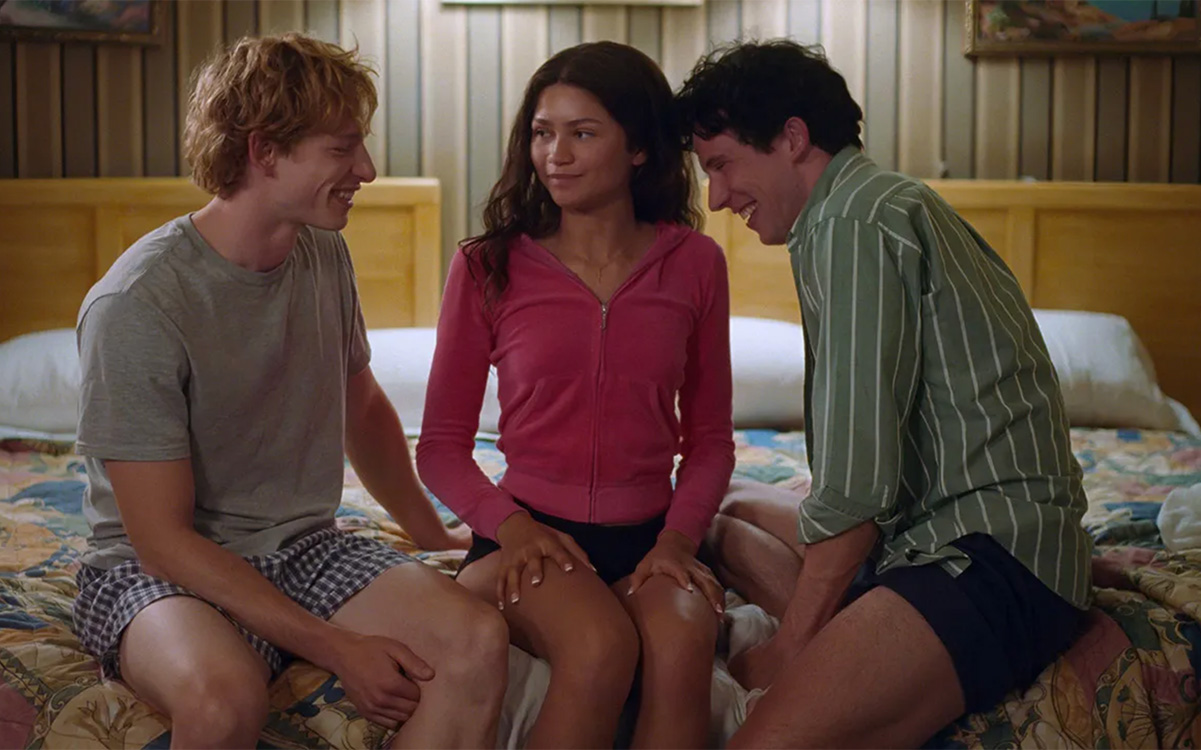
For months now, most of the buzz around Luca Guadagnino’s newest film – “Challengers,” starring Zendaya as a professional tennis coach caught in an ongoing romantic triangle with a pair of male rival players – has been about how “bisexual” it would be.
After all, this was the man that brought us “Call Me By Your Name,” and even if the Italian filmmaker’s work has not always been that queer in focus, this premise was begging for it; and when the trailers started to drop, heavily laden with imagery that made the bisexual subtext blatantly obvious, the speculation – and the anticipation – only grew.
As it turns out, “Challengers” wasn’t teasing us in vain – but it may not even matter, because after spending two hours and 10 minutes with these characters, it’s hard to imagine any viewer, whether straight, bi, or a total “Kinsey 6,” wanting to feel represented by them.
Told in a non-linear patchwork format, Guadagnino’s movie – penned by Justin Kuritzkes – chronicles the complicated relationship that develops when two high school tennis champs, boyhood friends Patrick and Art (Josh O’Connor and Mike Faist, respectively), encounter high-profile pro prospect Tashi (Zendaya) at the US Open juniors. Infatuated at first sight as much by her prowess at the game as by her looks or personality, they woo her together, resulting in a steamy but thwarted three-way experience that ends with her promising her phone number to the one who wins the next day’s match.
More than a decade later, Tashi and Art are a married, wealthy power couple with a child; they’ve risen to fame after Tashi, sidelined by injury into a career as a world-class coach, has helped Art rise to international prowess, while Patrick, who originally won the challenge to become Tashi’s lover, has sunken to the level of low-ranked has-been after brief professional success. Art has hit a slump in his upward trajectory, so to freshen up his game, Tashi enters him into a small-time “challenger” tournament where Patrick, now scraping by on his meager winnings from lower circuit events such as this one, is a “wild card” entry. The rekindling of old rivalries and complex feelings between this intertwined trio of “players” results in a final competition in which the outcome has more to do with unrequited personal passions than it does with tennis.
Ostensibly both a sports movie and a romantic drama, it’s a film that wastes no time in tying its two themes together for an exploration of how the competitive instinct that might be essential to one can be a major obstacle when it comes to the other. Thanks to its back-and-forth time structure, we are rushed through all the necessary twists and turns of a 13-year romantic triad quickly enough to recognize immediately that the need to “win” supersedes every other desired outcome for these three people; more than that, in the broad strokes that emphasize the quick deterioration of their affections in the pursuit of the “game” (a word we use here both literally and figuratively), it becomes obvious that none of them are capable of recognizing how much influence their lust for victory has over their relationships with each other. To put it bluntly, in an era when polyamory has gained traction as a legitimate variation on the spectrum of human commitment, “Challengers” reads a little bit like a primer on how NOT to do it right.
That might, of course, be a big part of the point. In a story about professional athletes driven by the urge for victory trying to negotiate the delicate balance of self-respect and selflessness required to maintain a successful romantic partnership – no matter how many partners may be involved – it’s probably an inescapable element of the plot that there would be a struggle to reconcile those two conflicting impulses. The trouble is that, here, the three characters involved are so far removed from typical human experience that it becomes difficult to relate to any of them. They operate within a privileged world that is out of reach for most of us, and the conflicts that arise in their triad dynamic mostly arise from pure ego. It’s hard to feel empathy for such individuals, frankly, especially when it’s clear that their own mindset is the greatest obstacle to fulfillment in their lives, both professionally and personally. They’re all spoiled brats, and unrepentantly so.
It’s because of this that “Challengers” comes off as the kind of glossy, old-Hollywood fantasy that is more about wish fulfillment than anything else. Each of its protagonists is impossibly attractive; fit, sexy, and living an enviable life even when they’re struggling just to get by. They are the kind of people many of us wish we could be – and that, ironically, perhaps makes us dislike them all the more.
None of this is the fault of the players, who uniformly give the kind of fully invested performance that illuminates the humanity of their characters beyond negative cliches. Zendaya, never shying from her role as master manipulator in the film’s twisted “long con” romance, makes us feel the visceral need for competition that eclipses her less imperative impulses toward personal connection. O’Connor (“God’s Own Country,” “The Crown”) and Faist (Broadway’s “Dear Evan Hansen,” Spielberg’s “West Side Story”) are not only eminently likable, but present an unvarnished and completely believable chemistry as would-be-lovers who can’t quite get past their self-judgment to embrace the obvious feelings they have for each other. The fact that we believe equally in their impulse toward the dazzlingly self-actualized Zendaya makes their performances all the more stellar. Unfortunately, within the larger context of the film, their appeal is tarnished by our ambivalence toward the dynamic the characters perpetuate between themselves.
And what of their sexuality? Is “Challengers” that rare mainstream movie that vaults over the film industry’s long-lamented “bi erasure” to present a bisexual love story for the ages? Not quite. Even if its ending (spoiler alert!) suggests that the entire movie has been about two men getting over their toxic masculinity to embrace their true feelings for each other, the fact that it never defines that relationship as a queer one and chooses instead to leave it up to our individual interpretation feels like something of a cop out. In the long run, perhaps, it’s a better tactic to avoid labeling its relationships in terms of sexuality, since the cultural “endgame” at stake has arguably more to do with normalizing diversity than amplifying an individual sense of identity – but even so, it can’t be denied that, when “Challengers” reaches its final moment, we’re left with a sense of ambiguity that feels far too “safe,” too much a capitulation to the fragile mainstream sensibility, to advance a sense of acceptance for the “B” in “LGBTQ.” In the end, it’s a movie that stops short of the mark for the sake of the lowest common comfort zone.
Which is why, sadly, we have to set “Challengers” aside as a failed – if well-meaning – attempt at providing visibility for the most traditionally invisible faction of the queer community, instead of the unequivocal validation of bisexual attraction we’re still waiting to see.
Movies
‘Housekeeping for Beginners’ embraces true meaning of family
Another triumph from young filmmaker Goran Stolevski
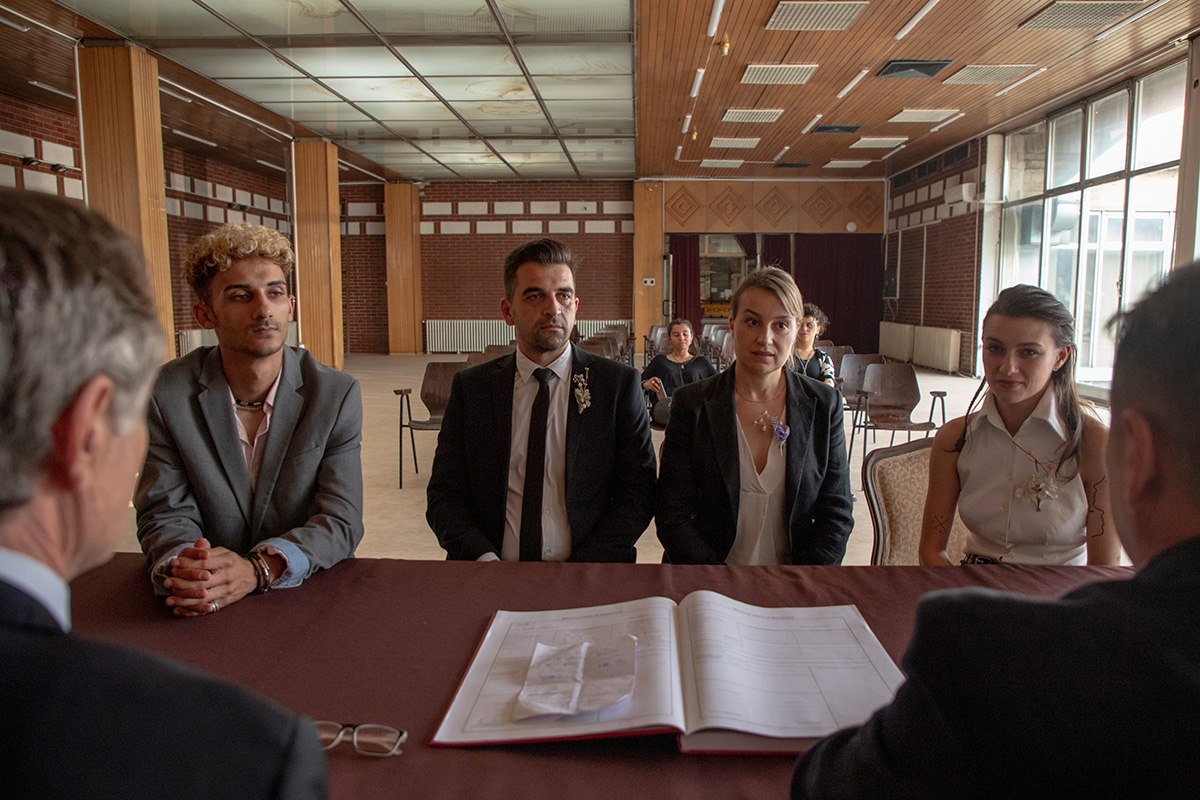
Once upon a time in America, queer people sometimes adopted their lovers as their “children” so that they could be legally bound together as family.
That’s not a revelation, though some queer younglings may be shocked to learn this particular nugget of hidden history, nor is it a call to political awareness in an election year when millions are actively working to roll back our freedoms. We bring it up merely as a sort of context for the world that provides the setting in “Housekeeping for Beginners,” the winner of the Queer Lion prize at 2023’s Venice Film Festival, which opened in limited U.S. theaters on April 5 and expanded for a wider release last weekend.
Written and directed by Goran Stolevski – a Macedonian-born Australian filmmaker whose two previous films, “You Won’t Be Alone” and “Of An Age,” both released in 2022, each met with critical acclaim – and submitted (unsuccessfully) as the official Oscar entry for International Feature from the Republic of North Macedonia, it’s a movie about what it means to be “family,” which touches on the political while placing its focus on the personal – in other words, on lived experience rather than ideological argument – and, in the process, drives home some very important existential warnings at a time when things could go either way.
Set in the North Macedonian capital of Skopje, it centers on social worker Dita (Anamaria Marinca), a middle-aged lesbian, whose house is a safe haven for a collection of outcasts. First and foremost is her girlfriend Suada (Alina Serban), a single mother of Romani heritage, but the “chosen family” in the household also includes Suada’s daughters, teenaged Vanesa (Mia Mustafi) and precocious 5-year-old Mia (Dżada Selim); Dita’s long-term friend Toni (Vladimir Tintor), a middle-aged gay man who works night shifts at a mental hospital; Toni’s new, much-younger boyfriend Ali (Samson Selim); and Elena (Sara Klimoska), an older and more worldly schoolmate of the other girls who serves as a makeshift big sister.
It is, unsurprisingly, a chaotic environment, a sea of revolving situations that largely goes on without Dita’s direct involvement, though she occasionally asserts more authority than she either has or cares to wield. That all changes, however, when Suada is diagnosed with aggressive pancreatic cancer, leading her to extract from her lover the promise that she will be mother to her children when she’s gone.
If you want a spoiler-free experience, you should stop reading now; further discussion of “Housekeeping for Beginners” requires us to reveal that Dita is forced to make good on that promise, even though she’s never had the desire to be a mother, and it’s not just a matter of making sure the kids get all their daily meals and show up for school on time. In North Macedonia, where same-sex relationships are not illegal but are neither granted the validation of lawful protections, the adoption of children requires a woman to have a husband, which means entering into a sham marriage with Toni – who is not quite a 100% onboard, himself – and listing him as the girls’ father. More difficult, perhaps, is gaining the trust of Suada’s two daughters, neither of whom is exactly receptive to the prospect of exchanging their real mother for a half-willing replacement. It’s this challenge that proves most daunting, triggering a crisis that will put every member of this cobbled-together family group to the test if they are to have any hope of hanging on to each other and making it work – something to which Dita finds herself growing deeply committed, despite her initial reticence about taking on the role of default matriarch.
Shot in Stolevski’s accustomed milieu – an intimate, cinema verité style built on handheld camerawork and near-exclusive reliance on close-up framing to capture the awkward blend of comfort and claustrophobia that often accompanies life in a crowded household environment – and leaving most of the expository cultural details, such as the impact of ethnic “caste” and the complicated hierarchy of layers involved in negotiating a peaceful coexistence with “normal” Macedonian society when your domestic and familial structures are anything but “normal”, to be gleaned by context rather than direct explanation. It works, of course; there’s something universally recognizable about the difficulty of “blending in” that helps us bridge the gap even if we don’t quite understand all the fine points as well as we might if we, like Stolevski, had grown up having to deal with them directly.
Even so, there are times when a bit of distance might be missed by audiences in need of a wider scope; it’s hard, after all, to get a palpable sense of space and location when most of what we see onscreen are the upper thirds of whichever cast members happen to be featured in each particular scene. But in case that sounds like a criticism, it’s important to point out that this is part of the film’s magic spell – because by making its physical environment essentially synonymous with its emotional one, Stolevski’s movie delivers its human truth without the unnecessary distraction of learning the ins and outs of a foreign cultural dynamic. The things we need to grasp, we do, without question, even if we don’t quite understand the full context, and what we walk away with in the end is a universally recognizable sense of family, carved in stark relief among a group of people who find it among themselves despite the lack of blood ties or common history to bind them to each other. That makes “Household for Beginners” an unequivocal triumph in one way, at least, because by driving home that hard-to-convey understanding, it manages to underscore the injustice and inhumanity of any world in which the validity of a family is subject to the judgment of cultural bias.
That’s not to say that “Housekeeping” is an unrelenting downer of political messaging. On the contrary, it is lifted by a clear imperative to show the joys of being part of such a family; the humor, the snark, the bright spots that arise even in the darkest moments – all these are amply and aptly portrayed, making sure that we never feel like we are being fed a doom-and-gloom scenario. Rather, we’re being reminded that it’s the visceral happiness that comes from being connected with those we love that matters far more than the rules and judgments of outsiders, which makes the hoops Dita and company have to jump through feel all the more absurd.
Though Stolevski, an Aussie citizen unspooling a narrative based in his country of origin, might not have intended it as such, the message of his film strikes a particular chord in 2024 America. The hardships of Dita and her brood as they try to simply stay together are a clear and pointed warning not to take for granted the hard-won freedoms that we have.
Add to that a superb collection of performances (BAFTA-winner Marinca and first-time actor Selim are standouts among the many), and you have another triumph from a young filmmaker whose reputation only gets more stellar with each effort.

